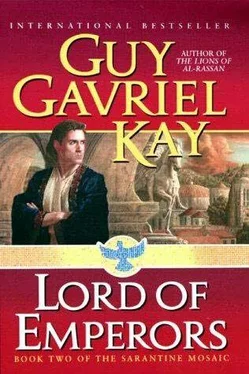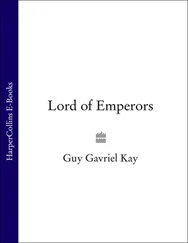Further, there had been dramatic and lethal purges in the ranks of the Excubitors after the role some of them had played in the assassination. Some innocent, highly capable men had undoubtedly been among those executed, but that was a risk to be assumed by those belonging to a small, elite company when absolute truth was hard to come by. At the very least it could be said that they'd failed to detect treachery among their fellows and paid a price for that.
This treachery, of course, had placed the new Emperor on his throne but that-one need hardly say-was not a relevant point.
Carullus, complaining volubly, had had to content himself with yet another shift and promotion-when he was appointed one of the three ranking officers just below the new Count of the Excubitors. It was a very substantial rise this time, a court office, not just a military one.
"You have any idea," he fumed one night, having spent a day in the Imperial Precinct absorbing information, "how many changes of clothing a man needs in this position? How often you change each day? How many ceremonies I'm expected to learn? Want to know what you wear for escorting fucking envoys from the fucking Karchites? I can tell you!"
He did, in detail. It seemed to help him to talk, and it was good, Crispin found, to have someone else's troubles (such as they were) to consider.
They ended up in The Spina every night, Pardos and Vargos accompanying them, various others coming and going at their booth. It was regarded as their booth by then. Carullus was a well-known, well-liked man, and Crispin had achieved, it appeared, a certain notoriety. It had also become known that he was leaving. People kept stopping by.
Pardos had surprised Crispin. He had decided to stay in Sarantium, continue to work at his craft here, despite the changes in matters of faith. With time to reflect, later, Crispin was to understand how he'd misjudged his former apprentice. It appeared that Pardos, now a fully fledged member of the guilds of course, had his own discomfort about working with certain images.
It had begun to change for him, Pardos said, while he was labouring to preserve that vision of Jad in Sauradia. A conflict of piety and craft, he'd said, stumbling, an awareness of his own unworthiness.
"We're all unworthy," Crispin had protested, fist on the table. "That's part of the point of it!"
But he'd let it slide, seeing Pardos's evident distress. What was the profit in making the other man unhappy? When did you ever change someone's views on faith, even a friend's?
Distraught as he obviously was about what was to happen to the work on the dome (spear-butts and hammers pounding, tesserae shattered and falling), Pardos was content to work on a secular scale, to make a life here, doing scenes for the state in administrative buildings, or private commissions for the courtiers and merchants and guilds who could afford mosaics. He could even work for the factions, he said: Hippodrome images for the walls and ceilings within the compounds. The new doctrines prescribed against rendering people only in a holy place. And for the wealthy, a mosaicist could still offer marines capes, hunting scenes, interwoven patterns for flooring or walls.
"Naked women and their toys for whorehouses?" Carullus had asked, cackling, making the younger man blush and Vargos frown. But the soldier had only been trying to change the mood.
Vargos, for his part, had made an immediate offer to sail west with Crispin. A difficulty, that, one that needed to be addressed.
The next evening, mostly sober, Crispin had gone walking with him through the City. They'd found an inn near the walls, far from anyone they were likely to know, and the two of them talked alone for a time.
In the end, Crispin had dissuaded him, not without effort and not 'without regret. Vargos was well on the way to making himself a life here. He could be more than a simple labourer-could apprentice himself to Pardos, who would be thrilled to have him. Vargos liked the City, far more than he'd expected to, and Crispin made him acknowledge that. He wouldn't be the first of the Inicii to force the Imperial City to give him a welcome and a decent life.
Crispin also admitted that he had no idea what he was going to do when he got home. It was hard to see himself doing fish and seaweed and sunken ships on a summer-house wall in Baiana or Mylasia now. He didn't even know if he would stay at home. He couldn't accept the burden of Vargos's life, of having the other man follow wherever his uncertain path carried him. That wasn't friendship, really. It was something else, and Vargos was a free man here. Had always been his own, free man.
Vargos didn't say a great deal, wasn't someone who argued, was certainly not the sort to inflict himself anywhere or on anyone. His expression revealed little as Crispin spoke, but that night was difficult for both of them. Something had happened on the road, and it had made a bond. Bonds could be broken, but there was a price.
It was deeply tempting to invite Vargos to come west. Crispin's uncertainty about his future would be balanced by having this man with him.
The big, scarred servant he had hired at the western border of Sauradia to take him along the Imperial Road had become someone whose presence brought a measure of stability to the world.
That could happen, when you went into the Aldwood with someone, and came out. They didn't speak of that day at all, but it underlay everything that was said, and the sadness of parting.
Only at the end did Vargos say something that brought it briefly to the surface. "You're sailing?" he had asked, as they were settling their account in the tavern. "Not back along the road?"
"I'd be afraid to," Crispin had said.
"Carullus would give you a guard."
"Not against what frightens me."
And Vargos had nodded his head.
"We were… allowed to leave," Crispin had murmured, remembering fog on the Day of the Dead, Linon on the dark, wet grass. "You don't test that by going back."
And Vargos had nodded again and they had gone back out into the streets.
A few days later they had to pretty much carry Carullus from The Spina. The soldier was caught in such a whirlwind of emotion it was almost comical: his marriage, his meteoric rise, which meant at the same time missing a glorious war, his delight in what had happened to his beloved Leontes set against what that meant to his dear friend, and an awareness, day by passing day, of Crispin's onrushing departure date.
That particular night as they drank he talked even more than usual. The others were almost in awe of his volubility: stories, jests, observations in an endless stream, battlefield experiences, lap-by-lap recollections of races seen years ago. He wept at the end of the night, hugging Crispin hard, kissing both his cheeks. The three others took him home through the streets. Approaching his own door Carullus was singing a victory song of the Greens.
Kasia heard him, evidently. She opened the door herself, in a night robe, holding a candle. The two other men supported Carullus as he saluted his wife and then made his precarious way-still singing-up the stairs.
In the hallway by the door, Crispin stood alone with Kasia. She gestured and they went into the front room. Neither said anything. Crispin knelt and poked at the fire with an iron rod. After a while the other two came down.
"He'll be fine, "Vargos said.
"I know he will," said Kasia. "Thank you."
There was a brief silence. "We'll wait down the street," Pardos said.
Crispin heard the door close as they went out. He stood up.
"When do you sail?" Kasia asked. She looked wonderful. Had gained weight, lost the bruised look he remembered in her eyes. They are going to kill me tomorrow. First words she'd ever spoken to him.
Читать дальше
Конец ознакомительного отрывка
Купить книгу










